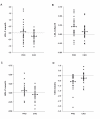Moderate carbohydrate, moderate protein weight loss diet reduces cardiovascular disease risk compared to high carbohydrate, low protein diet in obese adults: A randomized clinical trial
- PMID: 18990242
- PMCID: PMC2585565
- DOI: 10.1186/1743-7075-5-30
Moderate carbohydrate, moderate protein weight loss diet reduces cardiovascular disease risk compared to high carbohydrate, low protein diet in obese adults: A randomized clinical trial
Abstract
Background: To evaluate the metabolic effects of two weight loss diets differing in macronutrient composition on features of dyslipidemia and post-prandial insulin (INS) response to a meal challenge in overweight/obese individuals.
Methods: This study was a parallel-arm randomized 4 mo weight loss trial. Adults (n = 50, 47 +/- 7 y) matched on BMI (33.6 +/- 0.6 kg/m2, P = 0.79) consumed energy restricted diets (deficit ~500 kcal/d): PRO (1.6 g.kg-1.d-1 protein and < 170 g/d carbohydrate) or CHO (0.8 g.kg-1.d-1 protein and > 220 g/d carbohydrate) for 4 mos. Meal challenges of respective diets were utilized for determination of blood lipids and post-prandial INS and glucose response at the beginning and end of the study.
Results: There was a trend for PRO to lose more weight (-9.1% vs. -7.3%, P = 0.07) with a significant reduction in percent fat mass compared to CHO (-8.7% vs. -5.7%; P = 0.03). PRO also favored reductions in triacylglycerol (-34% vs. -14%; P < 0.05) and increases in HDL-C (+5% vs. -3%; P = 0.05); however, CHO favored reduction in LDL-C (-7% vs. +2.5%; P < 0.05). INS responses to the meal challenge were improved in PRO compared to CHO (P < 0.05) at both 1 hr (-34.3% vs. -1.0%) and 2 hr (-9.2% vs. +46.2%), an effect that remained significant after controlling for weight or fat loss (both P < 0.05).
Conclusion: A weight loss diet with moderate carbohydrate, moderate protein results in more favorable changes in body composition, dyslipidemia, and post-prandial INS response compared to a high carbohydrate, low protein diet suggesting an additional benefit beyond weight management to include augmented risk reduction for metabolic disease.
Figures


References
-
- McLaughlin T, Carter S, Lamendola C, Abbasi F, Yee G, Schaaf P, et al. Effects of moderate variations in macronutrient composition on weight loss and reduction in cardiovascular disease risk in obese, insulin-resistant adults. Am J Clin Nutr. 2006;84:813–821. - PubMed
LinkOut - more resources
Full Text Sources

